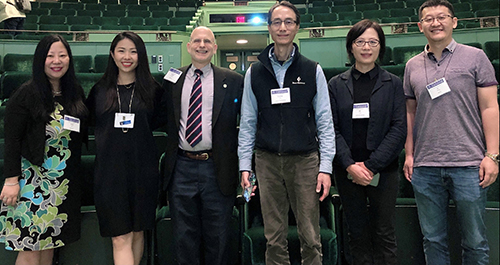ICSA Panel Discusses Real-World Statistics, Data Science Skills
During the 2023 International Chinese Statistical Association’s Applied Statistics Symposium, several panelists from industry discussed key statistics and data science skills. Here, panel moderator Kelly Zou summarizes their advice.
What are useful skills in quantitative disciplines?
Thomas Edison once said, “There is a way to do it better. Find it!” And Steve Jobs said, “Stay hungry, stay foolish.” Among individuals engaged in quantitative and scientific disciplines, cultivating a keen sense of curiosity and an unwavering commitment to constant (self) improvement are critical.
Joseph C. Cappelleri, Pfizer
Sisi Guo, AstraZeneca
Franklin Sun, Lexicon Pharmaceuticals
Jie Tang, Calico Life Sciences
Li Wang, AbbVie
Kelly H. Zou, Viatris (moderator)
Technical (hard) skills are necessary and must be kept sharp through continuous educational opportunities. There may not be so-called “pure” statisticians since our field interacts with so many disciplines; however, in terms of the industry sector, for example, it is heavily regulated. Therefore, adapting to new knowledge and understanding compliance requirements are critical.
We need to be nimble and agile in terms of new tools. After three or four years, classroom knowledge may be obsolete, although it tends to set a solid foundation in terms of statistical thinking. We may consider keeping the habit of exploring through the latest literature.
In addition to being proficient in data science and mathematical and applied statistics courses offered by colleges as part of standard curricula for all students, it is useful to be proficient in specialized topics such as Bayesian statistics, categorical data analysis, computational methods, cost-effectiveness analysis, decision analysis, econometrics, longitudinal data analysis, network and text data analysis, and survey statistics.
Besides clinical trials and real-world data, what are emerging trends?
Statisticians can be innovators and entrepreneurs. New trends can be data science, artificial intelligence, machine learning, deep learning, and natural language processing. Particularly in the health care field, new trends are drug discovery, drug development, precision medicine, health data, and health economics and outcomes research.
Statisticians learn fast and are used to adapting to new challenges. Moreover, statisticians are collaborators who can lead but also work with experts with various backgrounds. Problems can be complex and multi-dimensional, but they can also be exploratory.
The rapidly evolving methodologies in machine learning/deep learning and its applications are revolutionizing the entire spectrum of drug development. These advancements have already made a huge impact on drug discovery, manufacturing, trial design, precision medicine, patient identification and enrollment, safety monitoring, risk-based monitoring, novel endpoint development, and efficacy event prediction. They are poised to fundamentally reshape the landscape of drug development.
There are also the top 10 emerging trends in health economics and outcomes research published by the International Society for Pharmacoeconomics and Outcomes Research. In varying degrees, statistical principles and reasoning are applicable to each of them:
- Real-world evidence
- Value assessment
- Health equity
- Health care financing
- Patient engagement
- Drug and health care pricing
- Public health
- Health technology assessment
- Health data
- Artificial intelligence
How do students prepare for the industry sector beyond academic education?
First and foremost, students must be proactive while contemplating their first job. For example, participate in networking events to understand the types of industry opportunities and possible day-to-day activities.
If there are postdoctoral fellowship positions, PhD students may consider them as a first step toward the business world. For students who aspire to become statisticians, data scientists, and informaticians, they might explore entry-level jobs in which they use these skills. Mid-career researchers in academia might have methodological strengths that prepare them for industry. In addition to academic conferences, there are certificates and industry-academic partnerships or forums.
Students have spent most of their energy learning. Now it’s time for them to go from a learner to a contributor. Instead of trying to learn from their new job, they might ask how they can contribute. What can they do to improve the project or help the team. Of course, they should never stop learning. But now is the time to learn through gaining experience and contributing their knowledge and technical skills. And while technical skills are important, it is also important to present well and get along with colleagues.
One way to prepare for a job in industry is by attending conferences, seminars, and meetings sponsored by a professional society such as the. For example, the ASA Biopharmaceutical Section offers rich opportunities for engagement. Another way is to become acquainted with and even contribute to the methodological and content research literature in areas sponsored by industry.
Finally, finding the right mentor can accelerate a student’s acclimation.
Any advice on soft skills, mentorship, and professional networking?
Communication and leadership skills are the most important soft skills. Knowing how to tell a story so laymen can understand complex problems and setting up collaborations are areas statisticians can work on.
Professional networking is extremely important, not only in our own organizations but also in industry. We must be courageous and proactively reach out to get to know new people. Don’t be afraid to schedule a 30-minute introductory meeting with senior leaders. Engaging with professionals who have diverse functions can also provide a wealth of perspectives that will help build long-term (collaborative) relationships.
As a newcomer in a chosen organization or field, we may also look for senior or peer mentors, as well as friendly and trusting coworkers. Don’t hesitate to engage in confidential but straight talks with them. Mentorship is not one-directional.
Editor’s Note: The views expressed here are the panelists’ own and do not necessarily represent those of their employers.


















Thank you, industry panelists, for these suggestions! In quantitative professions, both technical and soft skills are critical to master. These come quite handy in various multi-disciplinary and cross-functional collaborative environments.
Leave your response!